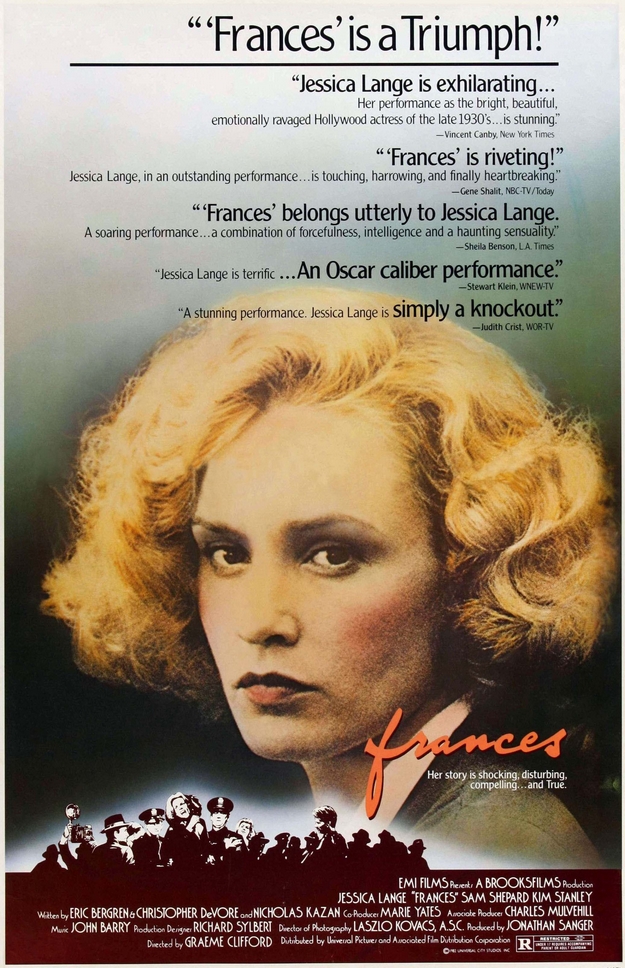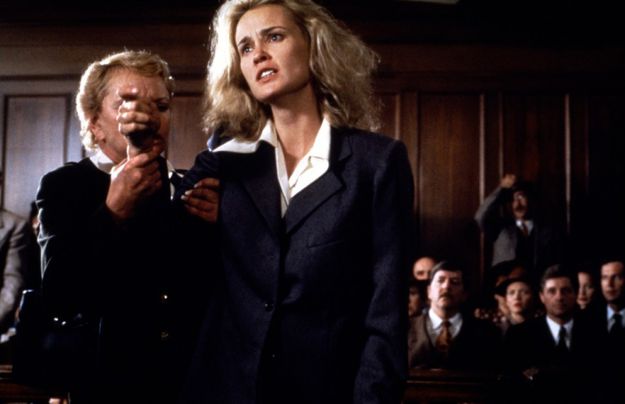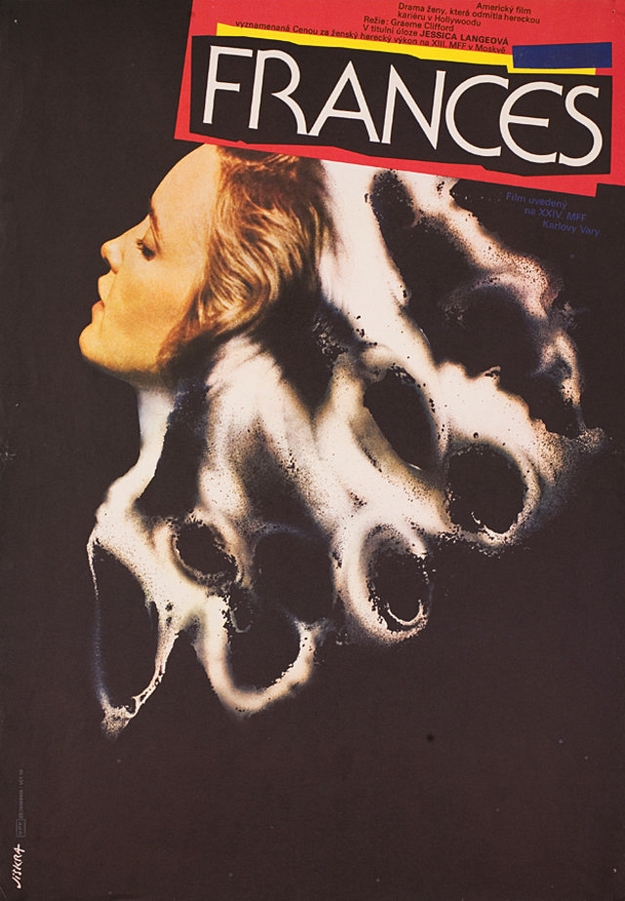Jessica Lange is Frances Farmer

| titre original | "Frances" |
| année de production | 1982 |
| réalisation | Graeme Clifford |
| photographie | László Kovács |
| musique | John Barry |
| interprétation | Jessica Lange, Sam Shepard, Anjelica Huston, Kevin Costner |
La critique de Sébastien Miguel pour Plans Américains
Ascension fulgurante et chute brutale de Frances Farmer (1913-1970), jeune femme belle, intelligente et talentueuse qui devint actrice à Hollywood au temps de la toute-puissance des grands studios et des ligues de vertus…
Premier film de Graeme Clifford (monteur du "Facteur sonne toujours deux fois"), l’œuvre semble appartenir à ces vanity projects qui contaminent Hollywood depuis sa création. Mais si "Frances" ressemble en effet à un simple produit à Oscar(s), ce biopic transcende pourtant le genre auquel il appartient : cf. la personnalité hors du commun de l’actrice concernée, la précision des rapports mère-fille (avec une Kim Stanley, monstrueuse), la description des ‘soins’ prodigués aux malades mentaux, l’évocation impitoyable des grands patrons de studio et, bien sûr, l’interprétation passionnée de Jessica Lange.
Moins une satire de Hollywood que le portrait puissant d’une âme libre impitoyablement écrasée par une société lâche et médiocre, le film reprend dans son introduction l’incroyable ‘essai’ de Frances Farmer de 1931, "God Dies", stupéfiante dissertation sur l’absence d’un Dieu inutile (voir ci-dessous).
Lange tournait pour la première fois avec son futur mari, l’acteur et écrivain Sam Shepard. Beaux comme des demi-dieux, le couple dégageait un charme et une complicité évidente.
Après "King Kong", John Barry retrouvait Jessica Lange et, une fois encore (mais est-il besoin de le préciser !), sa sublime partition enveloppait le film d’une tristesse et d’un romantisme désespéré(s).
D’autres actrices mythiques sombreront corps et âme dans l’enfer psychiatrique après avoir été broyées par l’usine de mort (Marilyn Monroe, Gene Tierney, Jean Seberg…), et il fallait sûrement une production d’un Nouvel Hollywood finissant pour porter à l’écran ce drame originel. Magnifiquement belle, révoltée et éperdue, Jessica Lange est splendide. Premier film important de Kevin Costner.

"God Dies"
The Scholastic, 2 mai 1931.
« No one ever came to me and said, « You're a fool. There isn't such a thing as God. Somebody's been stuffing you. » It wasn't a murder. I think God just died of old age. And when I realized that he wasn't any more, it didn't shock me. It seemed natural and right.
Maybe it was because I was never properly impressed with a religion. I went to Sunday school and liked the stories about Christ and the Christmas star. They were beautiful. They made you warm and happy to think about. But I didn't believe them. The Sunday School teacher talked too much in the way our grade school teacher used to when she told us about George Washington. Pleasant, pretty stories, but not true.
Religion was too vague. God was different. He was something real, something I could feel. But there were only certain times when I could feel it. I used to lie between cool, clean sheets at night after I'd had a bath, after I had washed my hair and scrubbed my knuckles and finger nails and teeth. Then I could lie quite still in the dark with my face to the window with the trees in it, and talk to God. "I am clean, now. I've never been as clean. I'll never be cleaner." And somehow, it was God. I wasn't sure that it was … just something cool and dark and clean.
That wasn't religion, though. There was too much of the physical about it. I couldn't get that same feeling during the day, with my hands in dirty dish water and the hard sun showing up the dirtiness on the roof-tops. And after a time, even at night, the feeling of God didn't last. I began to wonder what the minister meant when he said, « God, the father, sees even the smallest sparrow fall. He watches over all his children. » That jumbled it all up for me. But I was sure of one thing. If God were a father, with children, that cleanliness I had been feeling wasn't God. So at night, when I went to bed, I would think, "I am clean. I am sleepy." And then I went to sleep. It didn't keep me from enjoying the cleanness any less. I just knew that God wasn't there. He was a man on a throne in Heaven, so he was easy to forget.
Sometimes I found he was useful to remember; especially when I lost things that were important. After slamming through the house, panicky and breathless from searching, I could stop in the middle of a room and shut my eyes. "Please God, let me find my red hat with the blue trimmings." It usually worked. God became a super-father that couldn't spank me. But if I wanted a thing badly enough, he arranged it.
That satisfied me until I began to figure that if God loved all his children equally, why did he bother about my red hat and let other people lose their fathers and mothers for always? I began to see that he didn't have much to do about hats, people dying or anything. They happened whether he wanted them to or not, and he stayed in heaven and pretended not to notice. I wondered a little why God was such a useless thing. It seemed a waste of time to have him. After that he became less and less, until he was…nothingness.
I felt rather proud to think that I had found the truth myself, without help from any one. It puzzled me that other people hadn't found out, too. God was gone. We were younger. We had reached past him. Why couldn’t they see it? It still puzzles me. »


